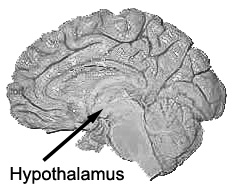Neuroscience For Kids
Waking Up to the Light
November 24, 2011
By Sutapa Ray, Ph.D., Neuroscience for Kids Guest Writer
 Do you find it difficult to fall asleep in bright sunlight and difficult
to stay awake in a dark room? We tend to be awake, alert and perky when
it's bright outside. Now scientists have discovered why the brain responds
in this way to light. They discovered that some nerve cells in the brain
become activated in the presence of light. These cells are found in the
hypothalamus, a pea sized structure in the base of the brain that controls
our body clock. When activated by light, the cells release a neurotransmitter called "hypocretin."
Do you find it difficult to fall asleep in bright sunlight and difficult
to stay awake in a dark room? We tend to be awake, alert and perky when
it's bright outside. Now scientists have discovered why the brain responds
in this way to light. They discovered that some nerve cells in the brain
become activated in the presence of light. These cells are found in the
hypothalamus, a pea sized structure in the base of the brain that controls
our body clock. When activated by light, the cells release a neurotransmitter called "hypocretin."
In these new experiments, scientists created mutant mice that could not
make hypocretin. These mutant mice had trouble staying awake in the
light. The researchers compared these mice to a control group of mice that
could make hypocretin. The light sensitive cells were very active in the
control mice in the presence of light, but not in the mutant mice. When
they tried to  teach the mice new tricks for a
reward, both sets of mice were able to learn just as well in the dark. But
in the light, the mice without hypocretin were not motivated to learn as
well as the mice with hypocretin. This may be something to keep in mind
when you are studying: a bright light may help you more than just to see
well.
teach the mice new tricks for a
reward, both sets of mice were able to learn just as well in the dark. But
in the light, the mice without hypocretin were not motivated to learn as
well as the mice with hypocretin. This may be something to keep in mind
when you are studying: a bright light may help you more than just to see
well.
People who suffer from a disorder called "narcolepsy" also find it hard to stay awake during the day just like the mice in the experiment. Scientists have found that people with narcolepsy are not able to make hypocretin. And now, with the help of the mouse studies, we have new ideas about how hypocretin helps people stay awake in the day and keeps them motivated to learn.
References and more information:
- McGregor, R., Wu, M.-F., Barber, G., Ramanathan, L. and Siegel, J.M., Highly specific role of hypocretin (Orexin) neurons: Differential activation as a function of diurnal phase, operant reinforcement versus operant avoidance and light level, J. Neurosci.,31 (43): 15455, 2011.
- Narcolepsy - from Neuroscience for Kids
Copyright © 1996-2011, Eric H. Chudler, University of Washington
